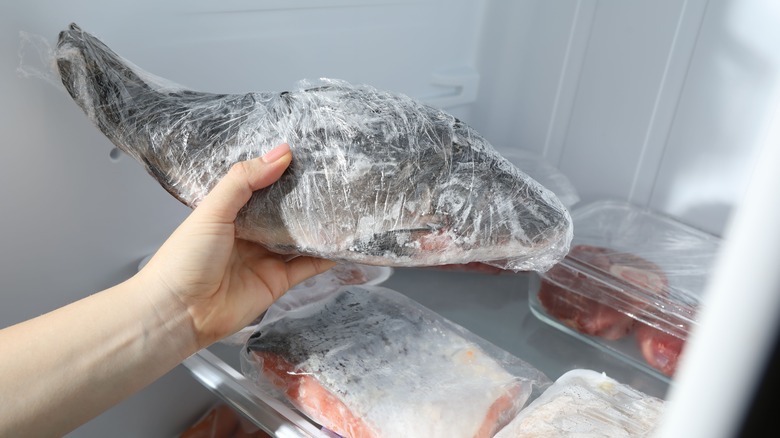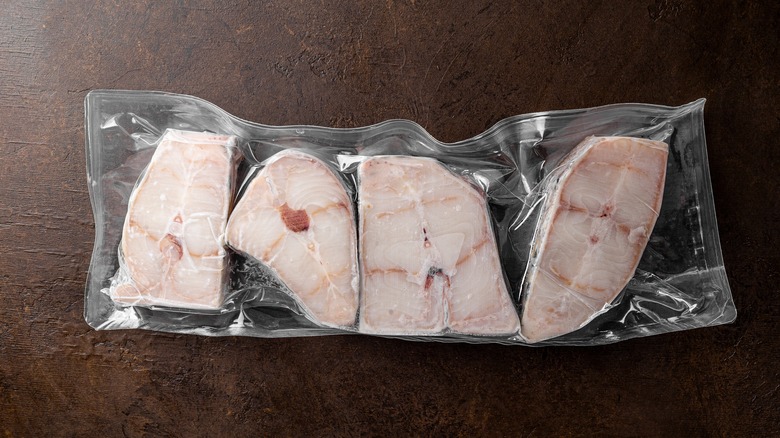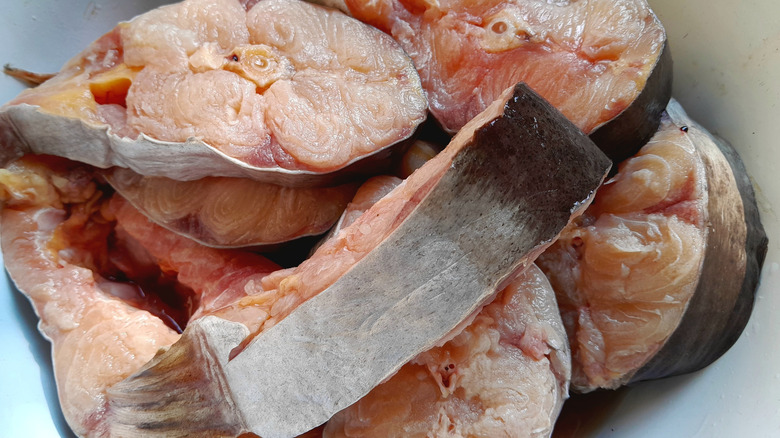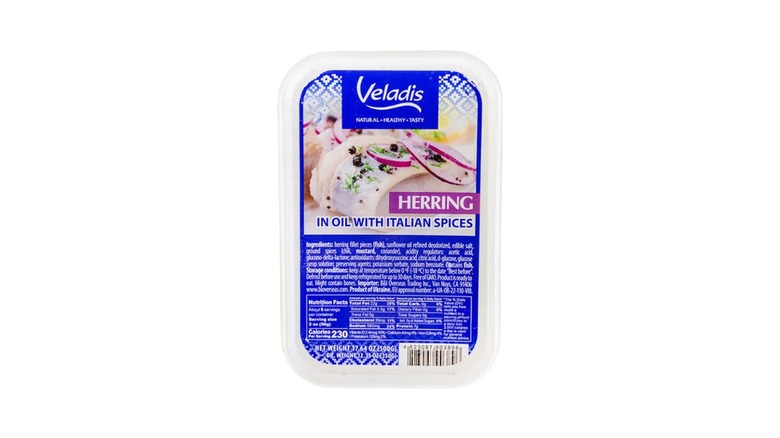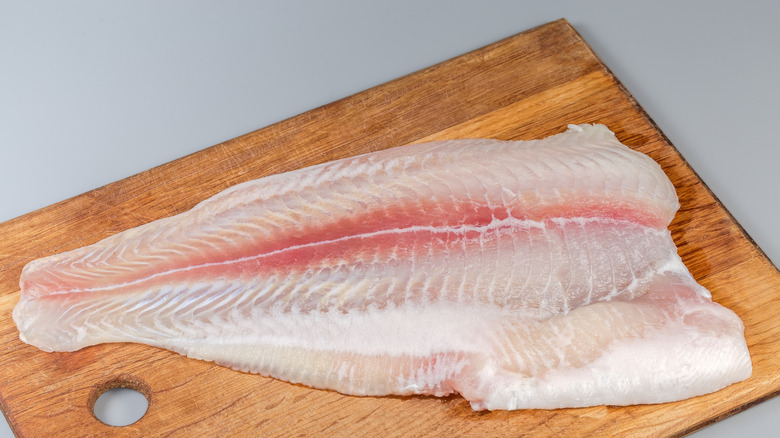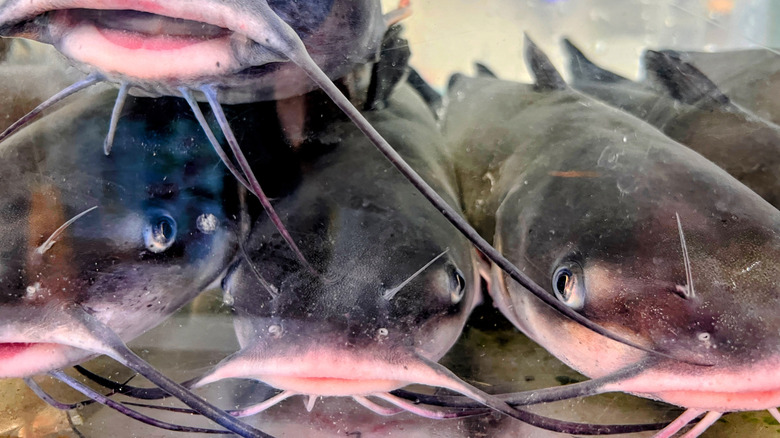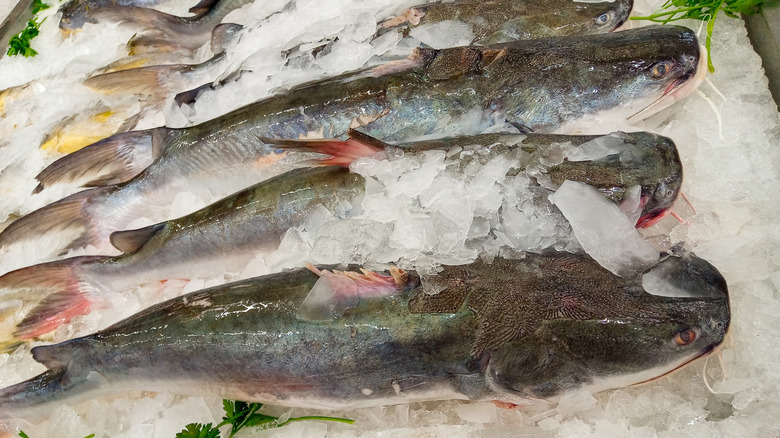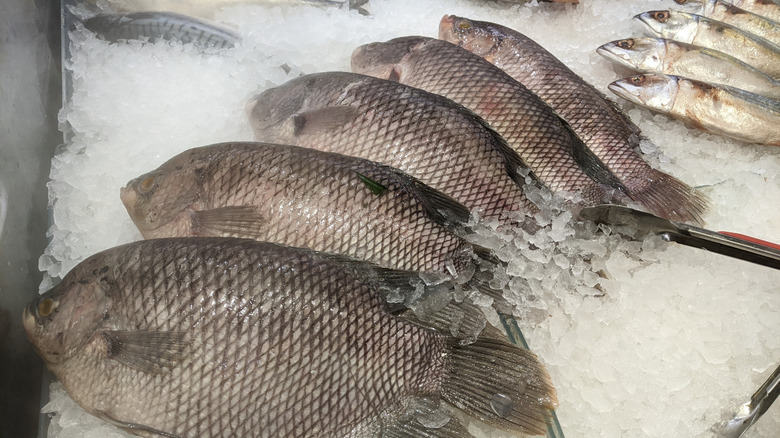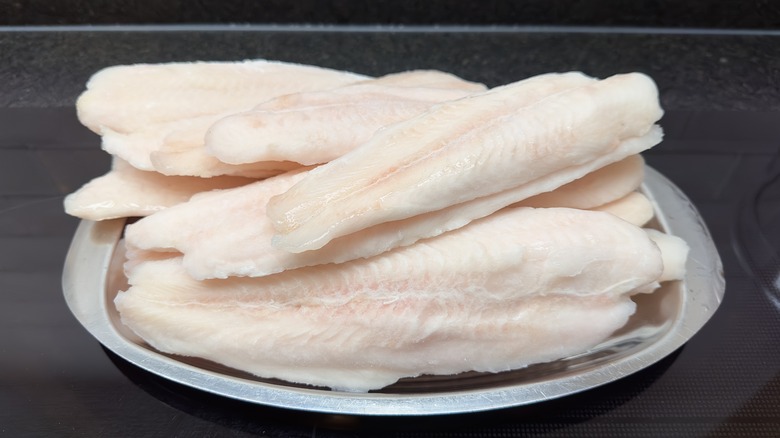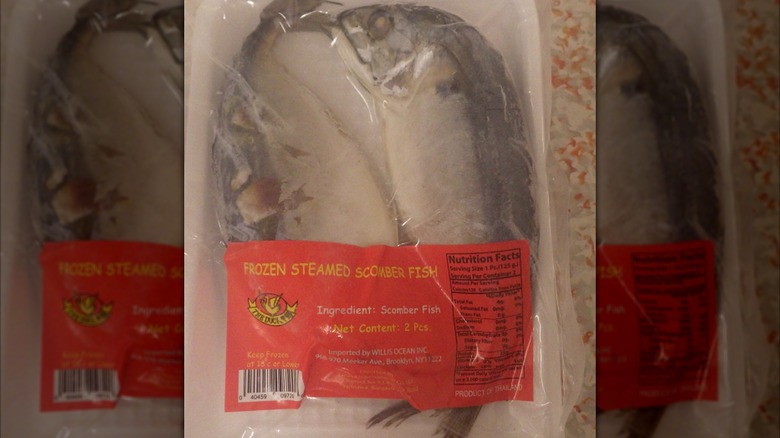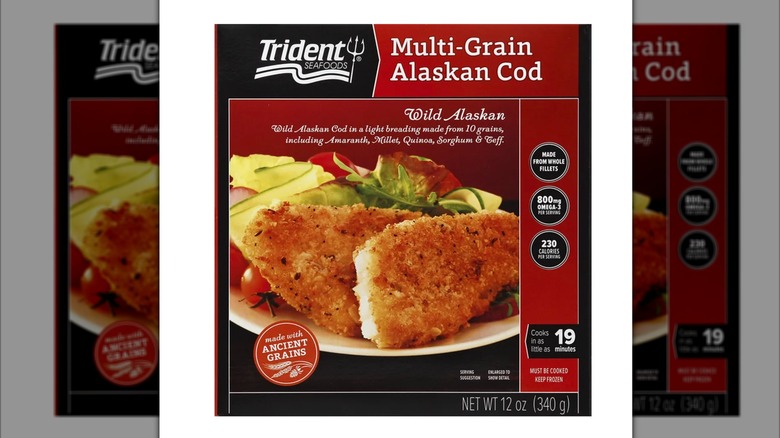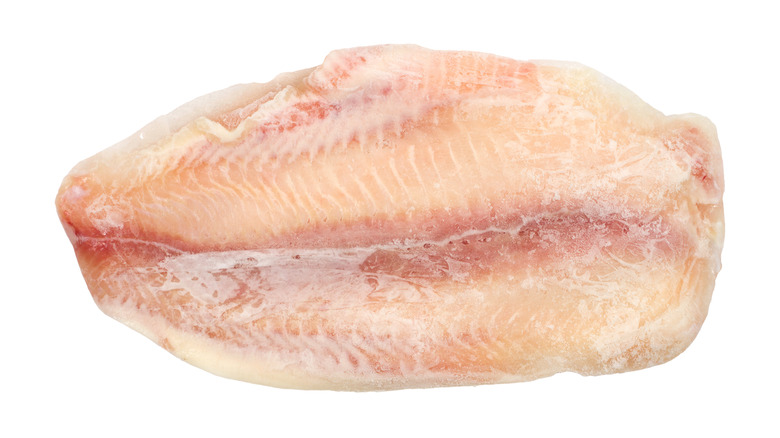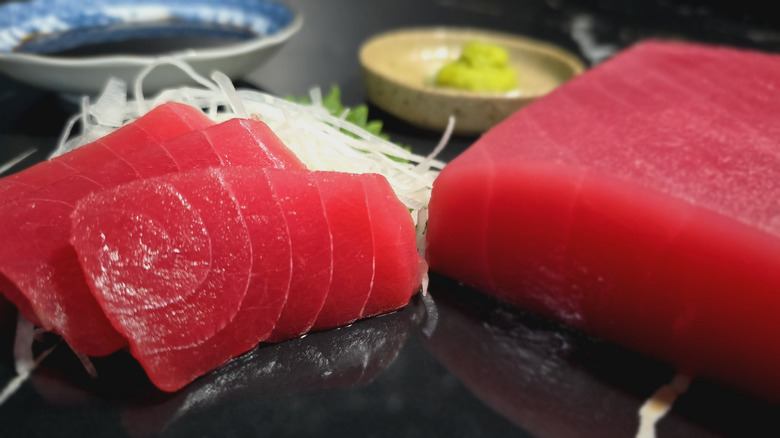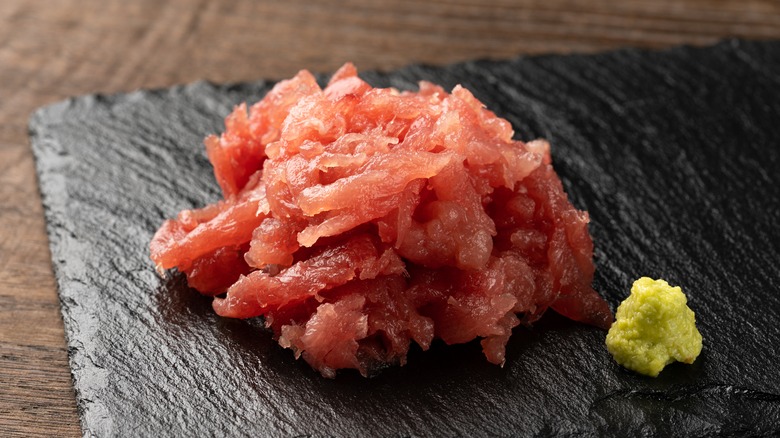13 Frozen Fish Recalls That Affected Millions
Frozen fish isn't just convenient, it's frequently the freshest option available, particularly for those living away from coastal areas. Seafood is often flash-frozen mere minutes after it's caught, preserving its flavor, texture, and nutritional value. In contrast, the so-called fresh fish at the supermarket is likely to have already been frozen and defrosted. Frozen fish typically also comes gutted, cleaned, and often pre-portioned for hassle-free cooking.
From one-pan fish tacos to Thai-inspired fried fish, fish is versatile and can be used in a wide range of dishes. Nevertheless, the final meal is only going to be as good as the quality of its parts. If the seafood isn't up to par, even the best recipes are likely to fall flat. In the worst case, the meal could even make you sick, especially if the fish wasn't stored or handled properly.
Like all seafood, we've seen plenty of frozen fish recalled over the years to avoid this very outcome. Here are some of the most significant frozen fish recalls to hit grocery stores in U.S. history.
Delight Foods USA recalls frozen catfish (2023)
In line with USDA regulations, only countries deemed to have inspection standards equivalent to U.S. systems are allowed to export food products (fish included) to the U.S. In 2023, Delight Foods USA came under scrutiny after importing siluriformes — better known as catfish — from India, one of the countries that is not considered eligible to export this fish to the U.S.
The 2-pound plastic packages of frozen catfish steaks were recalled after FSIS discovered that the products lacked the required USDA mark of inspection. In total, the Jersey City-based importer ended up withdrawing nearly 3,000 pounds of Seafood Delight frozen catfish bearing the label "Fresh Frozen Cat Fish Steak IF" from the market. The fish had been distributed to retailers throughout the country.
Highlighting the gravity of the incident, the FDA assigned the Delight Foods USA frozen catfish recall its highest designation. Class I recalls are issued in "a situation in which there is a reasonable probability that the use of, or exposure to, a violative product will cause serious adverse health consequences or death."
Otten's Seafood recalls fresh and frozen catfish (2021)
Known for its whisker-like feelers and mild flavor, catfish is one of the most widely consumed fish in the U.S. The bottom-dwellers often play center stage in Southern cooking, appearing in dishes like Southern fried catfish, where the fish is typically dredged in a cornmeal mix before being deep-fried.
In 2021, Otten's Seafood, which specializes in flash-frozen seafood, faced backlash for failing to follow basic protocols when putting the siluriformes on the market. The catfish, which had been wild-caught in the U.S., was distributed without federal inspection, which is a violation of food safety regulations. In total, Otten's Seafood ended up recalling more than 46,000 pounds of fresh and frozen catfish. The frozen catfish had a shelf life of one year, making the recall particularly concerning, since consumers may have forgotten the product was in their freezers. Otten's Seafood's catfish had been distributed to both wholesalers and retailers in Illinois and Indiana.
B&I Overseas Trading recalls frozen herring in oil (2020)
Herring is enjoyed in a variety of ways around the world, depending on regional culinary traditions. The small fish can be pickled, fermented, fried, smoked, or preserved in oil. It's this last method of preparation that came under scrutiny when B&I Overseas Trading recalled its herring in oil in 2020.
B&I Overseas Trading recalled its 17.64-ounce plastic packages of its Veladis Herring in Oil with Italian Spices over concerns that the product was contaminated with listeria. The fish was distributed at retail stores throughout Washington. It's unclear how the listeria ended up in the product or how B&I Overseas Trading became aware of the potential contamination.
Listeriosis is a foodborne infection caused by eating contaminated products, such as raw, unpasteurized milk, some types of cheese, vegetables, fruit, and raw or smoked fish. The symptoms of the infection in healthy adults typically include fever, headaches, stiffness, nausea, abdominal pain, and diarrhea. High-risk groups include pregnant people, infants, the elderly, and individuals with compromised immune systems, as they are more likely to experience severe symptoms. At worst, listeria can even be fatal, hence the urgency for a recall when there's even the slightest chance of contamination.
H&T Seafood recalls frozen swai fillets (2019)
Marketed under a range of names like sutchi catfish and panga, swai fish is usually imported into the U.S. from Vietnam. The fish is budget-friendly, with a pleasant flavor and firm texture, which can make it appealing to some consumers. Unfortunately, swai comes with a range of potential problems. It's often farmed in poorly regulated conditions, increasing the risk of antibiotic use and bacterial contamination.
Given that Vietnam is a global hub of swai farming, it's not surprising that H&T Seafood sourced its swai fish from the Southeast Asian country. What's surprising, however, is that the company didn't follow regulations and present the products for USDA inspection. The affected product was boneless and skinless Fisherman's Wharf Swai Fillets, sold in 1-pound bags. The lack of inspection came to light during a compliance visit by FSIS staff to a retail store. The frozen fish was distributed in Florida, Georgia, Louisiana, and South Carolina. Luckily, no adverse health effects were linked to the seafood at the time of the recall.
Premium Foods USA recalls frozen catfish (2019)
The Premium Foods USA 2019 frozen catfish recall came in two waves. The first occurred in July, when the company pulled more than 76,000 pounds of frozen catfish from the market. The second followed in October of the same year, after an additional 40,000 pounds of the product were also recalled. This means that, all in all, Premium Foods USA ended up withdrawing more than 121,000 pounds of frozen catfish from commercial circulation in 2019.
Both recalls were initiated because Premium Foods USA imported the frozen fish from Bangladesh and Myanmar illegally. More specifically, catfish can't be legally imported into the U.S. from either country. Not only did Premium Foods USA ignore this ban, but it also failed to present the frozen fish for import reinspection. The products were distributed to retailers in nine states overall: Colorado, Connecticut, Florida, Georgia, Illinois, Michigan, New Jersey, New York, and Pennsylvania.
J Deluca Fish Company recalls frozen yellow walking catfish (2019)
Particularly popular in Southeast Asian dishes, yellow walking catfish can be grilled, stewed, or curried. It's a mildly flavored fish that readily takes on the flavor of spices and sauces. In 2019, J Deluca Fish Company recalled two varieties of its Nautilus Seafood frozen yellow walking catfish products. The fish were raised on farms in Vietnam, from where they were imported into the U.S.
The recall was announced after it was discovered that the 40-pound bags of the product were imported into the country without reinspection by federal authorities. It also didn't help that the frozen catfish were farmed at a facility in Vietnam that had not been cleared to export siluriformes fish products to the U.S. The catfish, which were produced between August 2018 and January 2019, were sent to distributors and stores throughout the country, resulting in a widespread recall. In total, the company pulled nearly 70,000 pounds of yellow walking catfish from the market.
Golden International Corporation recalls frozen tilapia (2018)
Tilapia is one of the most popular seafood options consumed in the U.S., alongside shrimp, salmon, and canned tuna. Budget-friendly and widely available, tilapia is often prepared with spices and seasoning, which complement its mild taste. The fish is frequently imported into the U.S. from abroad.
The Golden International Corporation frozen tilapia recall of 2018 involved fish that had been slated for return to Taiwan, from which it had been imported. Although the reason for this decision is unclear, the tilapia never made it back to its country of origin. Instead, 405 cartons of the frozen product were stolen from Golden International Corporation's yard in Renton, Washington, on April 29. While the container was recovered on May 9, officials were concerned that the fish could have been redistributed to grocery stores. Improperly refrigerated seafood is a breeding ground for bacteria and can quickly become unsafe to eat.
It transpired that the fish container tested positive for salmonella, making this recall even more urgent. This foodborne bacteria can cause symptoms such as diarrhea, fever, nausea, and vomiting. Salmonella can be especially dangerous for young children, seniors, and individuals with weak immune systems, and may lead to hospitalization and death.
Vinh Hoan USA recalls frozen swai filets (2017)
Foreign countries that export siluriformes — including swai fish — to the U.S. must meet a number of criteria under FSIS regulations. One of these is the requirement that imported shipments must undergo reinspection. In 2017, Vinh Hoan USA issued a recall of its frozen swai fish products due to non-compliance with these regulations. To be precise, the frozen fish was imported from Vietnam without the required residue sampling and testing.
In total, Vinh Hoan USA ended up recalling about 84,000 pounds of frozen swai filets produced between December 16, 2016, and January 7, 2017. The 15-pound cases of the product were branded as Mekong Master Frozen Swai Filets. The frozen seafood was distributed to wholesalers in Illinois, Indiana, Kansas, Minnesota, Missouri, and Wisconsin. While no reports of illness were linked to the products, the FDA gave the recall a Class I designation, which applies to situations that could possibly lead to severe health complications and death.
Willis Ocean recalls frozen steamed scomber fish (2017)
Scomber fish, a type of mackerel, can be prepared in a range of ways, including frying and curing. Scomber fish can also be steamed, which is how the recalled product from Willis Ocean was processed before packaging. The Duck-branded frozen steamed scomber fish, which had been imported from Thailand, was recalled after it was discovered that the fish hadn't been properly eviscerated. The mackerel were packaged in styrofoam trays and wrapped in clear plastic.
The sale of uneviscerated fish is strictly not allowed under rules implemented by the New York State Department of Agriculture & Markets, which first discovered the issue. Fish that hasn't been properly cleaned and gutted is more likely to lead to botulism. Symptoms of the potentially fatal condition include dizziness, blurred vision, difficulty swallowing and breathing, and muscle weakness. Fortunately, the frozen scomber fish imported by Willis Ocean was not linked to any illnesses at the time of the recall.
Trident Seafoods Corporation recalls frozen multi-grain Alaskan cod (2017)
Often used in fish and chips and fish sticks, Alaskan cod has a mild, sweet taste and a delicate, flaky texture. As such, it's no surprise that the fish is often processed into frozen, ready-to-bake filets. This was precisely the type of product that was recalled by the Trident Seafoods Corporation when a consumer reported that they found a piece of plastic in their seafood.
The 12-ounce boxes of frozen Trident Seafoods Multi-Grain Alaskan Cod were sold at stores such as Albertsons, Cub Foods, Jewel, Morey's, ShopRite, Sprouts, and Woodman's. The recall affected a dozen states in total, including Arizona, California, Colorado, Illinois, Kansas, Massachusetts, Minnesota, New Jersey, Pennsylvania, Texas, Washington, and Wisconsin. Further investigation revealed that the plastic fragments turned out to be inspection tags from an ingredient supplier. No injuries were linked to the frozen fish when the product was pulled from supermarket shelves.
U.S. Cado Holdings recalls frozen swai filets (2016)
The U.S. Cado Holdings frozen swai filet recall took place in three separate stages, all in 2016. The first recall, which was announced on June 20, involved 25,760 pounds of frozen swai. The second was initiated on June 25 and expanded the recall to include an additional 2,235 pounds of fish. The third and final recall took place on July 14, adding 1,650 pounds of fish to the recall tally.
Each recall was initiated because the frozen swai fish, which had been imported from Vietnam, failed to meet the necessary federal import requirements. The Deep Water Sea Food and Deltas Best Basa Brand frozen swai filets, which were all packaged in 15-pound cartons, lacked the FSIS residue testing and sampling necessary for commercial sale in the U.S. The products were not linked to any adverse health issues when the recall was announced. Nevertheless, the FDA gave the recall a Class I designation, highlighting a possibility that it could lead to serious health issues and even death.
Osamu Corporation recalls frozen yellowfin tuna (2015)
The U.S. is among the biggest importers of yellowfin tuna. While America sources most of its yellowfin tuna from Ecuador, Costa Rica, and Panama, the batch that led to the Osamu Corporation's salmonella recall in 2015 was actually imported from Indonesia.
Osamu Corporation issued a recall of its frozen yellowfin tuna after the fish was linked to at least 62 cases of salmonella poisoning, including at least 11 hospitalizations. Upon further investigation, it was discovered that the source of the contamination was the raw tuna used in sushi sold at grocery stores throughout the country. The same frozen fish was also distributed to restaurants. Bacterial infections were reported in at least 11 states, one of which was Minnesota, where the Minnesota Department of Health officials actually found salmonella in a tuna sample taken from a retailer. Distributors went on to also destroy any remaining supplies of the tuna.
Moon Marine USA Corporation recalls frozen yellowfin tuna scrape (2012)
For those unfamiliar with the finer points of commercial fish processing, tuna scrape is a product made by scraping meat off tuna bones. The fishy paste is typically used in sushi, sashimi, ceviche, and spicy tuna rolls. Some people have compared tuna scrape to the infamous meat filler colloquially known as "pink slime," aka a low-cost paste made from beef scraps. While the two are aesthetically similar, unlike tuna scrape, pink slime is normally treated with ammonia to kill bacteria.
In 2012, Moon Marine USA Corporation recalled its Nakaochi Scrape AA or AAA after the products were linked to more than 400 salmonella infections across 28 states, leading to at least 55 hospitalizations. In total, the company had shipped nearly 60,000 pounds of the frozen yellowfin tuna scrape to distributors who then forwarded it on to restaurants and grocery stores. That made this recall particularly tricky because some of the tuna was potentially repackaged, making it more difficult to identify and destroy.
